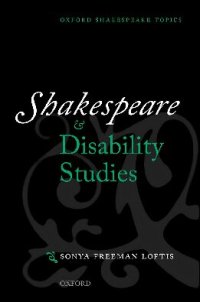
Ebook: Shakespeare and Disability Studies
Author: Sonya Freeman Loftis
- Series: Oxford Shakespeare Topics
- Year: 2021
- Publisher: Oxford University Press
- Language: English
- pdf
Shakespeare and Disability Studies argues that an understanding of disability theory is essential for scholars, teachers, and directors who wish to create more inclusive and accessible theatrical and pedagogical encounters with Shakespeare's plays. Previous work in the field of early modern
disability studies has focused largely on Renaissance characters that a modern audience might view as disabled. This volume argues that the conception of disability as residing within individual literary characters limits understandings of disability in Shakespeare: by theorizing disability
vis-a-vis characters, previous studies have largely overlooked readers, performers, and audience members who self-identify as disabled. Focusing on issues such as accessible performances, inclusive casting, and Shakespeare-based therapy, Shakespeare and Disability Studies reinvigorates textual
approaches to disability in Shakespeare by reading accessibility as an art form and exploring both the powers and potential limits of universal design in theatrical performance. The book examines the complex interdependence among the concepts of theory, access, and inclusion--demonstrating the
crucial role of disability theory in building access and examining the ways that access may both open and foreclose inclusive dramatic practice. Shakespeare and Disability Studies challenges Shakespearians, from students to audience members, from classroom teachers to theatre practitioners, to
consider how Shakespeare, as industry, as high art, and as cultural symbol, impacts the lived reality of those with disabled bodies and/or minds.
disability studies has focused largely on Renaissance characters that a modern audience might view as disabled. This volume argues that the conception of disability as residing within individual literary characters limits understandings of disability in Shakespeare: by theorizing disability
vis-a-vis characters, previous studies have largely overlooked readers, performers, and audience members who self-identify as disabled. Focusing on issues such as accessible performances, inclusive casting, and Shakespeare-based therapy, Shakespeare and Disability Studies reinvigorates textual
approaches to disability in Shakespeare by reading accessibility as an art form and exploring both the powers and potential limits of universal design in theatrical performance. The book examines the complex interdependence among the concepts of theory, access, and inclusion--demonstrating the
crucial role of disability theory in building access and examining the ways that access may both open and foreclose inclusive dramatic practice. Shakespeare and Disability Studies challenges Shakespearians, from students to audience members, from classroom teachers to theatre practitioners, to
consider how Shakespeare, as industry, as high art, and as cultural symbol, impacts the lived reality of those with disabled bodies and/or minds.
Download the book Shakespeare and Disability Studies for free or read online
Continue reading on any device:

Last viewed books
Related books
{related-news}
Comments (0)